Victims of Argentina’s dictatorship see step backward in Milei’s presidency
Critics accuse Javier Milei’s running mate Victoria Villarruel of denying atrocities that killed up to 30,000 people.
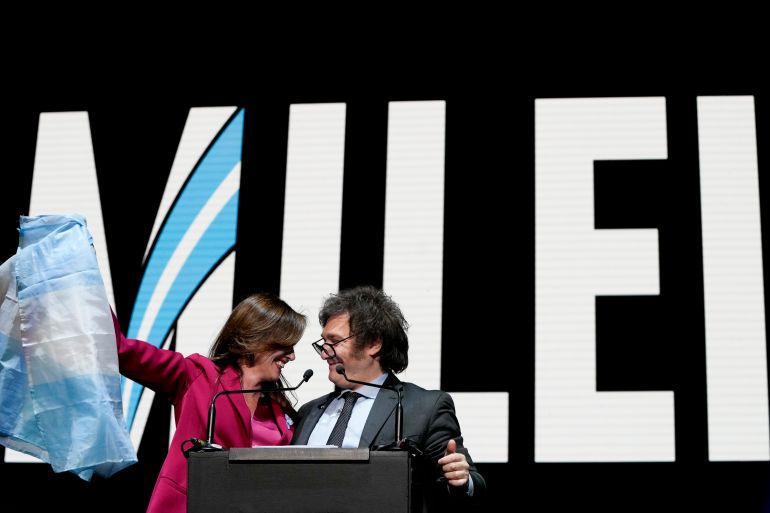
Buenos Aires, Argentina – At noon on January 12, 1977, soldiers burst into Alicia Partnoy’s home, tore her away from her 18-month-old daughter and threw her in the back of a truck.
For months, she endured torture in a concentration camp in the Argentinian city of Bahia Blanca, before finally fleeing to the United States as a refugee.
Keep reading
list of 3 itemsWith Milei leading Argentina’s presidential race, abortion is on the line
UNESCO recognises Argentina torture centre as a World Heritage site
Now, she is bracing herself for a presidential administration that she sees as justifying the actions of her tormentors.
Today, far-right economist and politician Javier Milei takes office as Argentina’s new president. At his side will be running mate Victoria Villarruel, a controversial figure, in part, for her views on the military dictatorship that ruled Argentina from 1976 to 1983.
Critics accuse Villarruel, a lawyer and former member of the Chamber of Deputies, of dismissing, downplaying and defending the abuses that occurred under the dictatorship, which killed an estimated 30,000 people.
Some survivors fear Villarruel and Milei’s ascent to power could even signal a return to authoritarian rule.
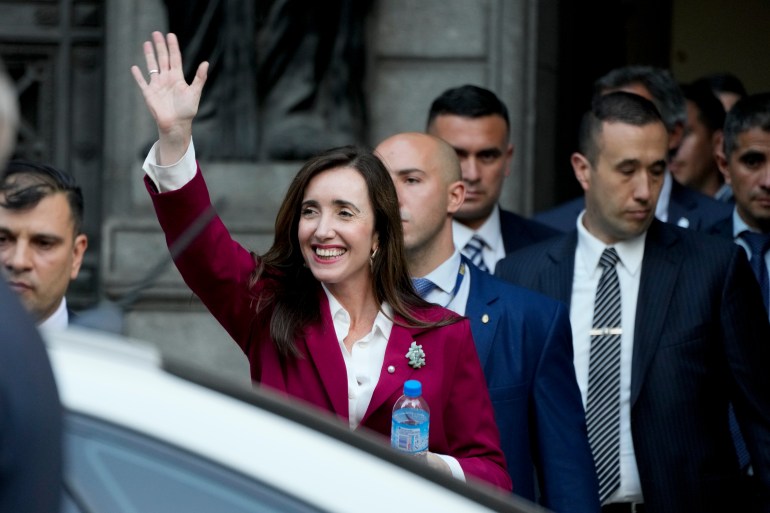
“Her convictions are the same convictions that produced the genocide in Argentina. Her ideas are the same ideas,” said Partnoy, 68, who has written books about her experience and now works as a human rights activist and lecturer at Loyola Marymount University.
Throughout her political career, Villarruel has made proposals that stoked those fears. She pushed for hefty increases to the military’s budget on the campaign trail and has called to abolish the memorial and museum at the Argentine Naval Petty Officers School, a former torture site.
“It brings you the worst nightmares,” said Agustin Cetrangolo, whose parents were kidnapped and tortured during the dictatorship. His father never returned.
Cetrangolo organises for the group Sons and Daughters for Identity and Justice Against Forgetfulness and Silence (HIJOS), which fights to hold members of the military dictatorship accountable for their crimes. He is among those concerned about an authoritarian turn under Milei.
“Right now it’s just in the world of fantasies, of speculation, but there is a real possibility it could happen,” Cetrangolo said.
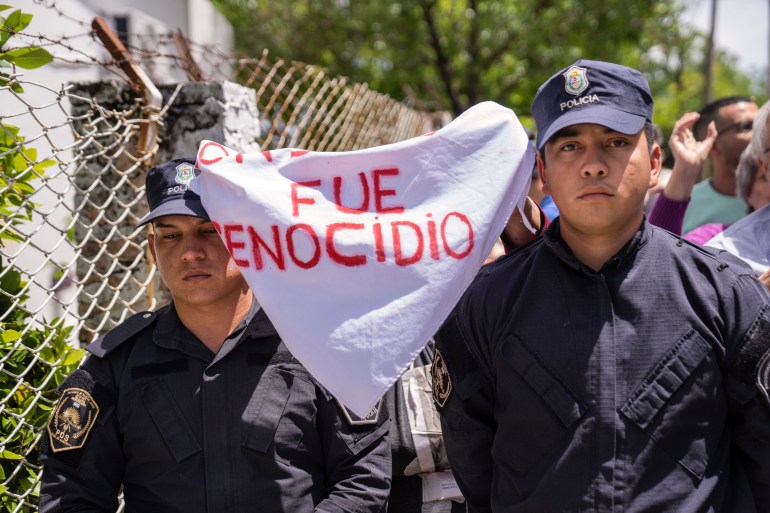
Revisionist history
Since Argentina’s return to democracy four decades ago, human rights activists have fought to preserve the history of the dictatorship and hold its perpetrators accountable.
The dictatorship came to power in a military coup and conducted a campaign of abduction, torture and execution to eliminate any perceived threats to its power, including student groups and left-wing activists.
In addition to the thousands who were killed, an estimated 500 children were kidnapped or born in custody, with some placed in military households where they never knew their true parents. Over 130 of these “stolen children” were later identified through DNA testing.
In 1985, the Argentinian government held a groundbreaking trial to bring top military leaders to justice. While some were acquitted, others were given lengthy sentences, including life in prison.
More than 1,200 “repressors” and “genocide perpetrators” have been convicted in the years since, according to Argentina’s Ministry of Justice and Human Rights.
Yet Villarruel, 48, comes from a parallel tradition that seeks to justify the actions of the dictatorship as a necessary evil.
The daughter of a prominent military family, she has asserted that military leaders were fighting a “dirty war” against left-wing militant groups, rather than carrying out a systematic campaign of violence against civilians.
In 2006, Villarruel founded the Center for Legal Studies on Terrorism and its Victims, which uses human-rights rhetoric to shift attention from the dictatorship to the victims of left-wing “terror” attacks.
“For 40 years, the victims of terrorism have been disappeared from memory,” Villarruel said in a September rally in Buenos Aires that provoked a counter-protest outside the venue.
She also raised eyebrows for her 2013 trip to visit the late military leader Jorge Rafael Videla in prison. He served as head of state during the dictatorship.
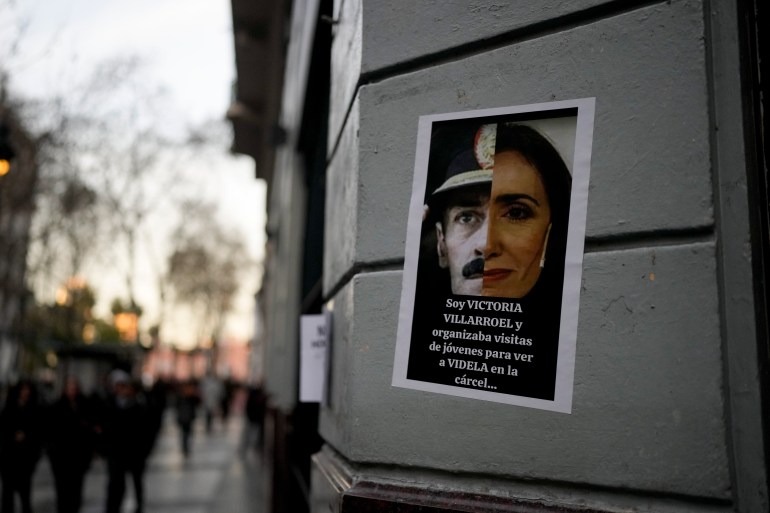
A conservative fringe
Emilio Crenzel, who researches historical memory of the dictatorship at the University of Buenos Aires, said Villarruel’s actions serve to “victimise” the perpetrators of the dictatorship, turning them into tragic figures worthy of sympathy.
“The victim has prerogatives in the public eye and the capacity to elicit empathy,” Crenzel said.
Through his studies, Crenzel has observed that the pursuit of accountability recedes when economic woes are at the forefront of Argentina’s politics.
He pointed to 1989, when protests over hyperinflation brought down the government of Raul Alfonsin, who presided over Argentina’s transition into a democracy and the 1985 trial of the dictatorship’s military leaders.
Now, Crenzel said, Argentina faces triple-digit inflation and a devalued currency. That made participants in November’s election more likely to vote based on immediate financial concerns, as opposed to long-term questions of human rights.
Yet Villarruel marks the first time a political movement in Argentina has won power with a discourse so openly supportive of the dictatorship’s actions, said Maximo Fernandez, a cultural promoter in the city of Cordoba whose parents were forced into exile during the dictatorship.
“Before, there was a certain degree of moderation,” Fernandez said. “These people don’t have it any more, and they say what they think, which is shocking.”
Yet, while Villarruel’s rhetoric has found supporters in the conservative fringes of the Argentinian electorate, experts say the majority of Argentines are not aligned with her position.
“I believe she does not represent more than 10 percent or 15 percent of the population,” Crenzel said.
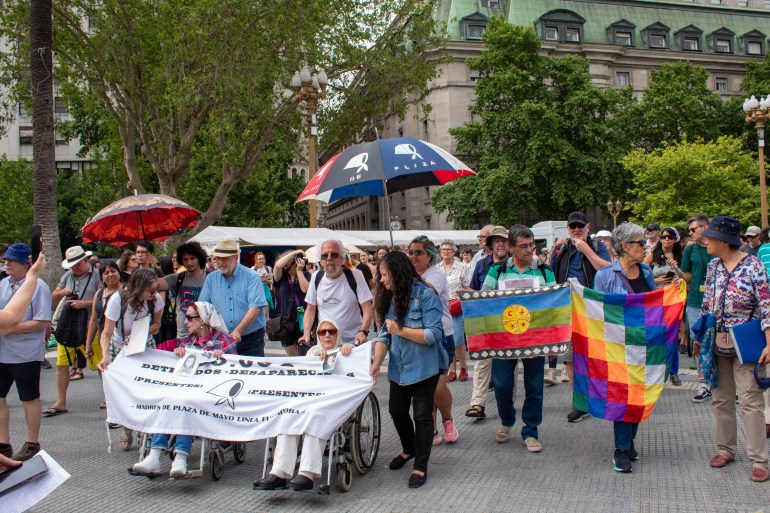
Reaching new generations
To capitalise on the lack of support for Villarruel’s ideas, Cetrangolo of HIJOS said the Argentinian human rights movement needs to do a better job reaching younger voters.
A November poll of 802 voters between ages 16 and 25 from the Argentinian publication Clarin showed overwhelming support for Milei, with nearly 77 percent holding a positive view. By contrast, just 13 percent had a positive opinion of his centre-left run-off rival, Sergio Massa.
This younger generation has no memory of the dictatorship, Cetrangolo pointed out. They rallied behind Milei largely out of frustration with the state of the economy.
“We’re not successfully connecting with the problems of today, at least among young people,” said Cetrangolo.
He recently started using TikTok to make videos about the dictatorship. “I’m focusing on the youth, which is where the production of memory and being able to share our testimony is most important.”
Other activists feel greater in-person mobilisation will be necessary to ensure the memory of the dictatorship is not lost.
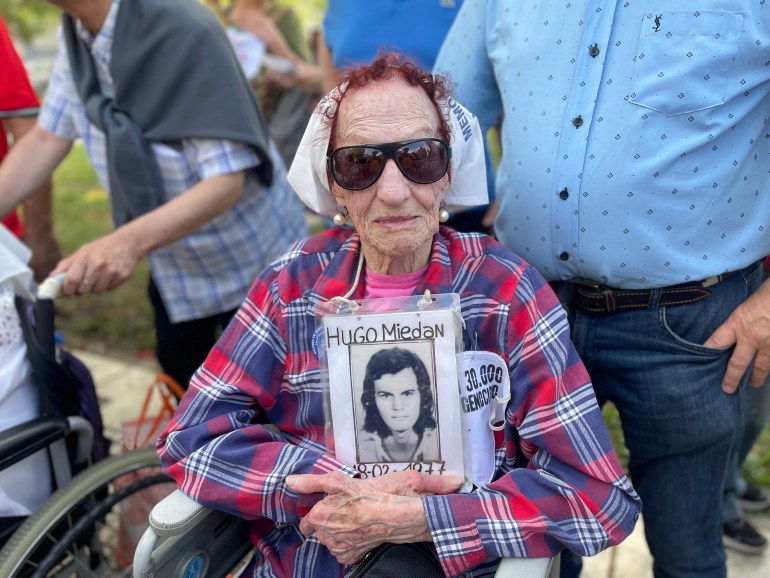
“Once again, we’re going to have to go out into the street to tell how they wounded us, tell our stories that are very dramatic and show the miserableness of our oppressors,” said Elia Espin, whose son Hugo Miedan was forcibly disappeared in 1977.
Espin, 92, is a member of the Grandmothers of the Plaza de Mayo, a movement founded by the mothers of activists who were abducted and killed during the dictatorship.
In 1981, they began donning white headscarves and holding weekly marches in the centre of Buenos Aires to demand the whereabouts of their children, many of whom have yet to be found.
Espin acknowledges that the election of Milei and Villarruel presents a challenge, but she remains undeterred from her quest for justice.
“We’re going to continue as long as we live,” Espin said. And even when she dies, she added that her fight will not be over: “Others will remain.”